Acknowledging that he has criticized pan-green and pan-blue politicians too harshly over the past week, Taipei Ko Wen-je (柯文哲) yesterday said he also believes that the Democratic Progressive Party (DPP) would not have supported him in the 2014 Taipei mayoral election if it could have won by itself.
Ko had been asked to comment on a remark that political commentator Yao Li-ming (姚立明), who was Ko’s executive campaign director for the 2014 election, made about him on a political talk show on Thursday.
Ko on Wednesday said that he “harbors resentment” toward President Tsai Ing-wen (蔡英文).
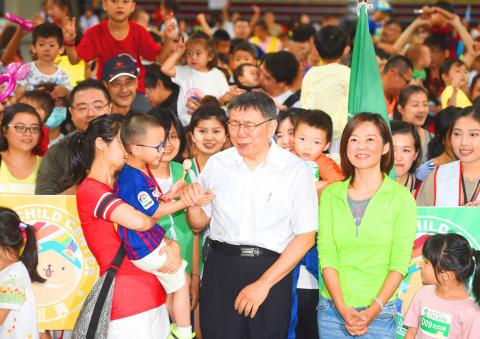
Photo: Fang Pin-chao, Taipei Times
Yao said that Ko was being “ungrateful,” because the term “white force,” which differentiates him from the pan-blue and pan-green camps, was actually thought up by campaign officials that Tsai had sent to help Ko.
“If the DPP could win the 2014 Taipei mayoral election, they would not have given me a chance, so the decision was made to suit their interests at the time,” Ko said yesterday. “What they did not expect was that this guy — Ko Wen-je — is not so obedient.”
He said becoming a politician was an accident, as he had been doing fine as a surgeon at National Taiwan University Hospital until an unexpected event occurred, and he stumbled upon the profession.
The breakup between the pan-green camp and the white force was due to the DPP not realizing that “not all those who criticize you are your enemy,” Ko said, adding that he does not like the divide between the pan-blue and pan-green camps, both of which have since about 1996 been labeling those outside their party as “the enemy.”
Since the Chinese Nationalist Party (KMT) on Monday announced that Kaohsiung Mayor Han Kuo-yu (韓國瑜) would face Tsai in January’s election, Ko has been criticizing Tsai, Han, the DPP and even Premier Su Tseng-chang (蘇貞昌).
“I have been reflecting ... about the harsh rhetoric I have used in the past few days,” he said, adding that he would try to restrain himself, as his mother told him that while he might soon forget what he said about others, the person he criticized might remember it for 20 years.
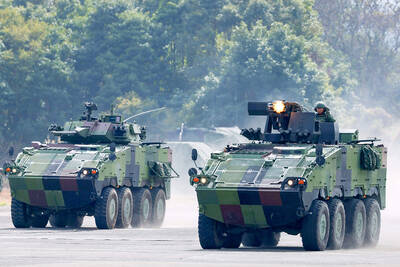
Taiwan must first strengthen its own national defense to deter a potential invasion by China as cross-strait tensions continue to rise, multiple European lawmakers said on Friday. In a media interview in Taipei marking the conclusion of an eight-member European parliamentary delegation’s six-day visit to Taiwan, the lawmakers urged Taipei to remain vigilant and increase defense spending. “All those who claim they want to protect you actually want to conquer you,” Ukrainian lawmaker Serhii Soboliev said when asked what lessons Taiwan could draw from Russia’s invasion of Ukraine. Soboliev described the Kremlin as a “new fascist Nazi regime” that justified
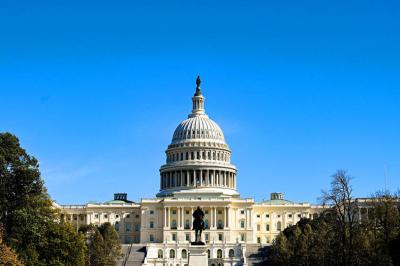
The US House of Representatives yesterday passed the PROTECT Taiwan Act, which stipulates that Washington would exclude China from participating in major global financial organizations if its actions directly threaten Taiwan’s security. The bill, proposed by Republican US Representative Frank Lucas, passed with 395 votes in favor and two against. It stipulates that if China’s actions pose any threat to Taiwan’s security, economic or social systems, the US would, “to the maximum extent practicable,” exclude China from international financial institutions, including the G20, the Bank for International Settlements and the Financial Stability Board. The bill makes it clear that China
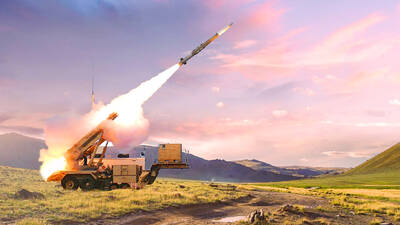
‘T-DOME’: IBCS would increase Taiwan’s defense capabilities, enabling air defense units to use data from any sensor system and cut reaction time, a defense official said A defense official yesterday said that a purported new arms sale the US is assembling for Taiwan likely includes Integrated Battle Command Systems (IBCS). The anonymous official’s comments came hours after the Financial Times (FT) reported that Washington is preparing a US$20 billion arms sale encompassing “Patriot missiles and other weapons,” citing eight sources. The Taiwanese official said the IBCS is an advanced command and control system that would play a key role in President William Lai’s (賴清德) flagship defense program, the “T-Dome,” an integrated air defense network to counter ballistic missiles and other threats. The IBCS would increase Taiwan’s
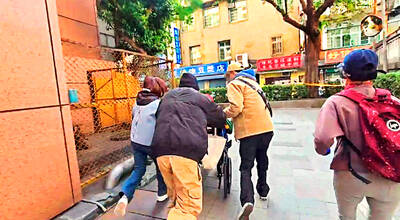
NOMINAL NEWLYWEDS: A man’s family and his wife — his long-term caregiver — are engaged in a legal dogfight over the propriety and validity of the recent union A centenarian’s marriage to his caregiver unbeknownst to his children has prompted legal action, as the caregiver accuses the man’s children of violating her personal liberty and damaging her reputation, while the children have sought a legal option to have the marriage annulled. According to sources, the 102-year-old man surnamed Wang (王) lives in Taipei’s Zhongshan District (中山) and previously worked as a land registration agent. Wang reportedly owns multiple properties and parcels of land worth several hundred million New Taiwan dollars and has ten children. His caregiver, a 69-year-old surnamed Lai (賴), has been caring for him since about 1999,